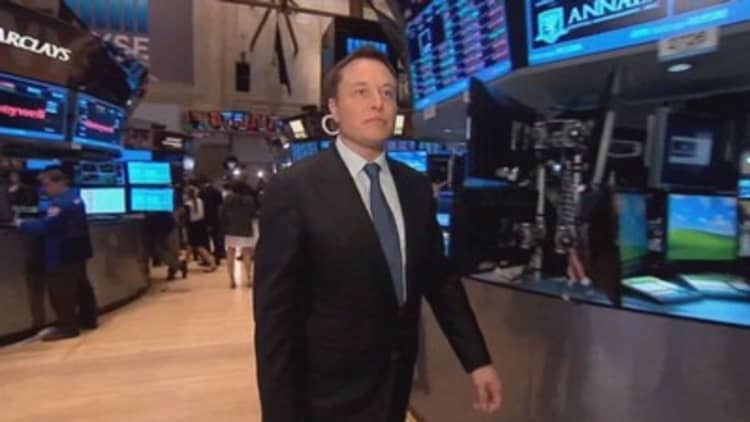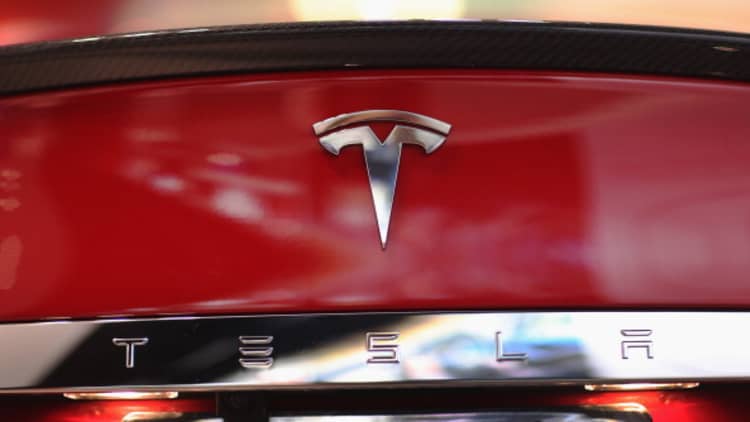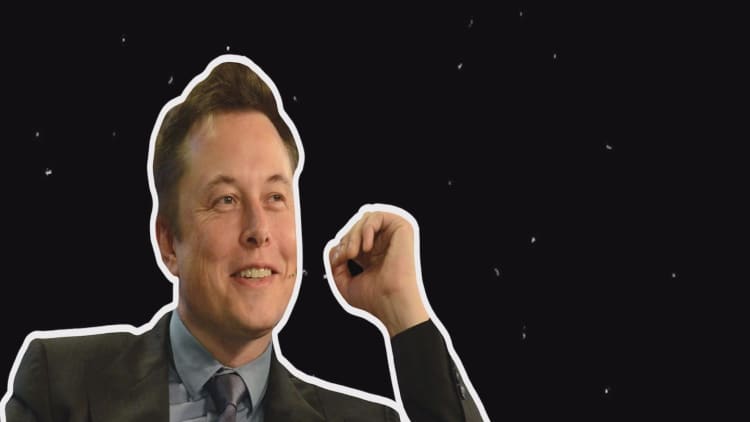While adoption of electric vehicles is picking up around the world, industry pioneer Tesla is facing a critical juncture and has started what CEO Elon Musk has characterized as a "thorough reorganization" of the company.
Shares fell 3 percent on Monday in a mixed market.
What's putting the most pressure on the carmaker?
Tesla is losing top talent
Tesla is losing top talent at a time when good morale is needed to help the company meet its aggressive Model 3 production goals.
Over the past seven months, at least nine employees at the senior management level or higher have left Tesla, and one is taking a leave of absence.
The list includes:
- Doug Field, senior vice president of engineering and the company's top vehicle engineer, who was announced on Friday to be taking a leave of absence
- Matthew Schwall, director of field performance engineering, the main technical contact with U.S. safety investigators
- Eric Branderiz, chief accounting officer and chief corporate controller
- Susan Repo, corporate treasurer and vice president of finance
- Jim Keller, vice president of Autopilot and low voltage hardware
- Jon McNeill, president of global sales, marketing, delivery and service
- Celina Mikolajczak, senior manager of battery technology, cell quality and materials analysis
- Jon Wagner, senior director of battery engineering
- William Donnelly, vice president of global financial services and president of Tesla Finance
- Jeff Evanson, vice president of global investor relations

Regulatory scrutiny
Tesla is dealing with four separate federal investigations into crashes involving its electric vehicles. The investigations are to evaluate whether Tesla's battery technology or Autopilot systems may have caused these collisions.
Its relationship with regulators has eroded in recent months. In April, the National Transportation Safety Board "revoked" Tesla's status as a party to its investigation of a fatal crash involving a Model X with Autopilot engaged.
More recently, the National Highway Traffic Safety Administration contradicted Tesla's claims. Tesla previously said that the NHTSA found its Autopilot technology reduced crashes significantly, but the agency said later that its regulators never actually tested the system's effectiveness.
Cash crunch
Tesla is showing signs of financial distress.
The automaker ended 2017 with $3.4 billion in available cash and $9.4 billion in outstanding debt. That debt will come due as Tesla needs more capital to increase Model 3 production and start work on new products, including an updated Roadster, a new Model Y vehicle and the Semi.
On its first-quarter earnings call, CEO Elon Musk said, "Tesla does not require an equity or debt raise this year, apart from standard credit lines."

But financial columnist Jim Collins recently noted the company is taking some steps that are unusual for companies with strong finances, including creating a special-purpose entity for certain debt and collateralizing its Fremont factory.
Also, Moody's downgraded Tesla's credit ratings recently, changing its outlook to negative from stable, citing "significant shortfall" in the Model 3 production rate and a tight financial situation.
Model 3 manufacturing
Efficient, high-volume production of the Model 3 has remained elusive for Tesla. The Model 3 is Tesla's first electric vehicle aimed at the mainstream driver. And in many ways, the company's future depends on its success.
Tesla had aimed to make 2,500 Model 3 sedans a week by the end of the first quarter but missed that goal. It now promises to hit 5,000 a week by the end of the second quarter — a rate it earlier said it would achieve in 2017.
Worker safety issues in its factories, troubles perfecting its factory automation and strained relationships with suppliers, including Panasonic, are not making it an easier task.



